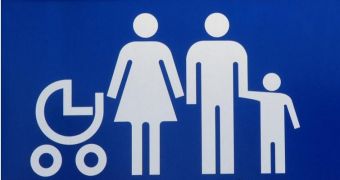Over the last couple of decades, sociologists have highlighted the fact that the traditional structure of the nuclear family is changing. In the United States, about half of all marriages fail, but only after the men and women in them have children. As a direct result, many kids are left with only one parent, and some have found it worthwhile to argue about whether mothers or fathers are best suited for the job. A new research looks at this issue, and attempts to settle the ongoing debate.
The classical view on families has it that children are far better off with both a mother and a father, and this indeed seems like the logical conclusion. But religious groups have long since abused this point of view, as evident in the 2008 California Marriage Protection Act, or Proposition 8, which amended the state's Constitution to state that only marriages between men and women were legal. In other words, the potential faith of children was used to promote an anti-same-gender-marriage agenda.
Conversely, other political figures have taken a stand as well, including President Obama. Rather than defending the nuclear family, he argued that the roles fathers played needed to be more widely recognized. “Of all the rocks upon which we build our lives, we are reminded today that family is the most important. And we are called to recognize and honor how critical every father is to that foundation,” the US President said in a statement last year, AlphaGalileo reports.
Even an article in the February issue of Journal of Marriage and Family argues that the “black-or-white” view needs to disappear from this debate. The researchers behind the paper say that children growing up without a father are not necessarily at a disadvantage when compared with their peers. They also argue against the idea that fathers or mothers each bring their set of indispensable and “unique” skills to parenting.
“Significant policy decisions have been swayed by the misconception across party lines that children need both a mother and a father. Yet, there is almost no social science research to support this claim. One problem is that proponents of this view routinely ignore research on same-gender parents,” University of Southern California (USC) College of Letters, Arts and Sciences sociologist Timothy Biblarz explains. “The bottom line is that the science shows that children raised by two same-gender parents do as well on average as children raised by two different-gender parents. This is obviously inconsistent with the widespread claim that children must be raised by a mother and a father to do well,” the expert adds.
“The family type that is best for children is one that has responsible, committed, stable parenting. Two parents are, on average, better than one, but one really good parent is better than two not-so-good ones. The gender of parents only matters in ways that don't matter,” New York University expert Judith Stacey says. “The social science research that is routinely cited does not actually speak to the questions of whether or not children need both a mother and a father at home. Instead proponents generally cite research that compares [heterosexual two-parent] families with single parents, thus conflating the number with the gender of parents,” the paper concludes.

 14 DAY TRIAL //
14 DAY TRIAL //